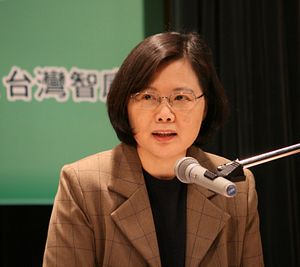Taiwan’s Democratic Progressive Party’s huge win in the recent local election surprised many analysts who expected the DPP to win, but not in a landslide. Two major questions, however, have not been successfully answered despite a large amount of analysis. First, why did the DPP win so definitively? Second, what will happen between now and 2016 in cross-strait relations?
Regarding the first question on why the DPP won so handily, many theories have been offered. There is the argument that the KMT’s poor governance performance is the main reason, particularly President Ma Ying-jeou’s unpopular social and economic policies among the people. There is also the argument that Taiwanese voters were unhappy with Ma Ying-jeou’s pro-mainland policies, especially after seeing what happened to Hong Kong in recent months. Others have also pointed out that a low turnout rate benefited the DPP and young people’s mobilization through social media disadvantaged the KMT, which traditionally has relied on older people and local factions. There is no doubt that all these arguments have some merit, particularly regarding President Ma’s policy mistakes.
However, a major reason missing from all these arguments is the role of the 1992 consensus, which has become a foundation for the stable and peaceful development of cross-strait relations after 2008, when Ma became president. Indeed, cross-strait relations have enjoyed their best time between 2008 and 2014 as both sides agreed on the ‘one China’ principle and signed more than 20 agreements that helped sustain Taiwan’s economic development. Part of this success should be credited to President Ma, who adopted bold mainland policies after becoming the president. It can be argued that it is within this broadly peaceful and stable environment that Taiwanese people could focus their attention on internal social and economic issues, without worrying about possible military conflict with the mainland. And this is the background reason why the DPP had a huge win this time.
The logic is quite simple. Voters, regardless of where they are from, mostly care about two things during elections: the domestic economy and external security. When external security becomes a major issue, voters are more likely to ignore internal economic problems. When external relations are stable, voters then would care more about internal economic issues. And this is exactly what is happening in Taiwan now, as peace and stability have dominated cross-strait relations since 2008. When voters focused their attention on internal economic issues, they were very unhappy about high housing prices, food safety issues, high inequality, lack of jobs, and so on. To be fair, voters should not blame President Ma’s pro-mainland policies for all of Taiwan’s economic problems, which in a major part result from Taiwan’s weak position in the globalized economy. In this sense, Taiwanese voters punished the KMT and President Ma unfairly.
What will happen between now and 2016 for cross-strait relations then? Perhaps this is the question most people are interested in. Will the DPP win the 2016 presidential election, given its strong win this time? The DPP has lost the last two presidential elections, particularly the 2012 one, because of its stubborn policy toward cross-strait relations. The core problem is that the DPP has not agreed on the ‘one China’ principle and the 1992 consensus, which brings a lot of uncertainty to cross-strait relations. The DPP Chairwoman Tsai Ing-wen is well aware of this problem, and this is why she and the DPP leaders have kept a calm attitude toward their huge win. They clearly understand that it would be very difficult for the DPP to win in 2016 unless the party can design a policy that is satisfactory to three key players here, i.e., the U.S., mainland China, and Taiwanese voters.
It is precisely because of this reason that we should not expect any reckless decision from the DPP that could jeopardize cross-strait relations, as one analyst has warned. The U.S., in the meantime, would also like to maintain a stable and peaceful state of affairs across the Taiwan Strait as it already has a full plate in Ukraine and the Middle East. The main theme for cross-strait relations will still be “peace and development” for the foreseeable future, mainly because no side is going to win if a big crisis arises once again, similar to the one we witnessed in the mid 1990s.

































